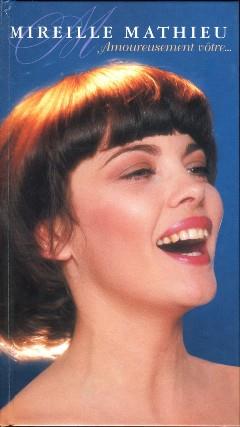Mireille Mathieu – Amoureusement Vôtre... (2002)
Mireille Mathieu – Amoureusement Vôtre... (2002)

1.1 La Vie En Rose 1.2 Je Suis Seule Ce Soir 1.3 Moulin Rouge 1.4 La Premier Rendez-vous 1.5 Les Trois Cloches 1.6 Padam-Padam 1.7 Ne Me Quitte Pas 1.8 Comme D'Habitude 1.9 Plaisir D'Amour 1.10 Milord 1.11 Non, Je Ne Regrette Rien 1.12 Les Feuilles Mortes 1.13 La Mer 1.14 C'Est Si Bon 1.15 Parlez-moi D'Amour 1.16 L'Hymne À L'Amour 1.17 La Quête (Inédite) 2.1 Une Femme Amoureuse 2.2 Un Jour On Dit Je T'Aime 2.3 A Blue Bayou 2.4 Un Dernier Mot D'Amour 2.5 Nos Souvenirs 2.6 Quelque Chose Est Arrivé 2.7 On Ne Vit Pas Sans Se Dire Adieu 2.8 Folle, Folle, Follement Heureuse 2.9 Oui, J'Ai Envie D'Etre Aimée 2.10 Tu M'Apportais Des Fleurs 2.11 Va Sans Moi 2.12 Romantica 2.13 L'Amour Oublie Le Temps 2.14 Un Peu De Bleu 2.15 Ciao Bambino, Sorry 2.16 Roma, Roma, Roma 2.17 L'Enfant De L'Irlande (Danny Boy) 2.18 Andy 2.19 Chanter 2.20 Mon Crédo 3.1 Pardonne-moi Ce Caprice D'Enfant 3.2 Allô 3.3 T'Aimer 3.4 Apprends-moi 3.5 Je T'Aime Avec Ma Peau 3.6 Au Dernier Printemps De Notre Vie 3.7 Qu'Attends-tu De Moi? 3.8 Mais Toi 3.9 Le Vent De La Nuit 3.10 Je Chante Pour Toi 3.11 Le Vieux Café De La Rue D'Amérique 3.12 Après Toi 3.13 Donne Ton Coeur, Donne Ta Vie 3.14 Je Me Parle De Toi 3.15 La Tête En Feu 3.16 C'Etait Pas La Peine 3.17 Vivre Pour Toi 3.18 Amour Défendu 3.19 Il Ne Reste Que L'Amour 3.20 Quand Tu T'En Iras (Version Inédite 2002)
French chanteuse Mireille Mathieu is classically known for her illustrious French crooning during the '60s and '70s. Born into a stone labor family of 14 children, Mathieu arrived July 22, 1946, in Avignon, France, and as a child she saved her money from working in the factory so she could pay for singing lessons.
In the early '60s, French pop vocalist Johnny Hallyday's manager Johnny Stark noticed Mathieu's enchanting vocalic beauty and later built her into her own star with the classic urchin hairdo and loud, vibrant costumes. She was quickly hailed as the next Edith Piaf and her 1965 performance run at the Paris Olympia sparked her recording relationship with Barclay Records.
Singles such as "Mon Credo," "C'est Ton Nom," and "Qu'elle Est Belle" made Mathieu an international star in Europe while achieving mild success in the Americas, but her cover of Englebert Humperdinck's "The Last Waltz" was an impressive French interpretation that made her impact charts in Britain. Humperdinck returned the favor by choosing to sing Mathieu's "Les Bicyclettes de Belsize." ---archive.is
download (mp3 @192 kbs):
yandex mediafire ulozto cloudmailru








